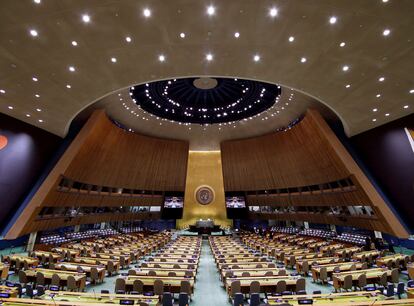The US and the EU should back a UN tax convention
It would be a mistake to present the negotiation of a U.N. convention on tax cooperation as an antagonism against other international institutions

This week will witness either a historic achievement in creating a more equitable global economy or a terrible failure. A vote at the United Nations decides whether the future of global decision-making on taxation will emerge from the negotiation of a genuinely inclusive framework convention, or if a group of rich countries successfully insist on maintaining the current ineffective and exclusionary arrangements.
The importance of Wednesday’s vote reflects the urgency of addressing the unfairness and inefficiency of the current system of corporate and wealth taxation. It is also a clarion call for the world to use multilateral principles to reach multilateral solutions. Success would demonstrate that the world can forge a different and better multilateralism — truly inclusive but also able to deliver fundamental reforms.
Almost a decade of multilateral negotiations on a global tax treaty at the OECD has yielded insufficient progress. The process has generated innovative ideas and a technical foundation on which to build a global tax system, but the type of solutions that the world needs remain far off. Independent research shows that the proposed “two pillar” solution would generate far less than the OECD had projected.
Disappointed that the intense OECD process has yielded so little, several African countries launched an initiative to shift the issue to the United Nations. The African Group’s proposal quickly gained impressive support from the G77 coalition of developing countries, which has been demanding a fair say in setting global tax rules for more than two decades.
The question to be decided this week is what rich economies like the United States and the European Union will do. If they oppose a binding U.N. framework convention (as they have signaled they will do), they will be sending a message that they prefer the current ineffective and unfair arrangements to the possibility of reforms that would benefit their own people by stemming the revenue losses their governments currently suffer.
It would be a mistake to think of a U.N. convention on tax cooperation in terms of antagonisms between international institutions. The African Group proposal, and the major support it has elicited from the G77, demonstrates that many developing countries want to improve the multilateral system without leaving anyone behind. Blocking the Resolution on Promotion of Inclusive and Effective International Tax Cooperation at the United Nations would send a dangerous signal that those who most loudly tout the benefits of a rules-based international order don’t actually believe in one.
We, the members of the Independent Commission for the Reform of International Corporate Taxation (ICRICT) believe that opposition to moving forward with negotiations for a specific convention at the U.N. would have dire consequences for the entire international system.
It is politically unwise to dismiss such broad support for global tax negotiations. And it is simply short-sighted to squander this opportunity to curb the revenue losses that all countries (including rich countries) and their people suffer due to untamed tax abuse.
The U.S. and EU should reconsider their stance, and back the Africa Group’s resolution.
This open letter is co-signed by:
Edmund Valpy Knox Fitzgerald, Jayati Ghosh (ICRICT, co-chair), Martín Guzman, Kim Jacinto-Henares, Eva Joly, Ricardo Martner, Léonce Ndikumana, José Antonio Ocampo, Irene Ovonji-Odida, Thomas Piketty, Magdalena Sepúlveda, Joseph E. Stiglitz (ICRICT, co-chair), Wayne Swan, Gabriel Zucman.
Sign up for our weekly newsletter to get more English-language news coverage from EL PAÍS USA Edition
Tu suscripción se está usando en otro dispositivo
¿Quieres añadir otro usuario a tu suscripción?
Si continúas leyendo en este dispositivo, no se podrá leer en el otro.
FlechaTu suscripción se está usando en otro dispositivo y solo puedes acceder a EL PAÍS desde un dispositivo a la vez.
Si quieres compartir tu cuenta, cambia tu suscripción a la modalidad Premium, así podrás añadir otro usuario. Cada uno accederá con su propia cuenta de email, lo que os permitirá personalizar vuestra experiencia en EL PAÍS.
¿Tienes una suscripción de empresa? Accede aquí para contratar más cuentas.
En el caso de no saber quién está usando tu cuenta, te recomendamos cambiar tu contraseña aquí.
Si decides continuar compartiendo tu cuenta, este mensaje se mostrará en tu dispositivo y en el de la otra persona que está usando tu cuenta de forma indefinida, afectando a tu experiencia de lectura. Puedes consultar aquí los términos y condiciones de la suscripción digital.








































